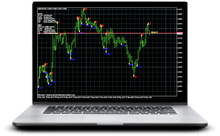Time Horizon
Time Horizon
A time horizon or investment horizon is the total length of time a security is expected to be held by an investor. Setting a time horizon for any investment usually has to do with the goals and aims of the investor. Time horizon types vary from short-term to long-term. Some traders set a longer investment horizon because they have more time to keep their portfolio invested and realize profits or offset the losses incurred. Normally, with a long-term horizon, investors feel more comfortable to take riskier investment decisions and capitalize on the market volatility. While with a short-term horizon, as in case of a day trader, investors need to be careful to avoid riskier investments, especially close to maturity, so that they don’t incur significant losses.
BREAKING DOWN Time Horizon
It is important to determine your time horizon before deciding, what type of assets you should have in your portfolio. If you do not need your money for a long time, for example, decades, you can own a riskier mix of investments compared to a person who needs money within the next few weeks or months.
The majority of advisors would suggest average 30-years-old investors to have asset allocation of a portfolio more heavily weighted in equities than that of someone who is close to retirement. But not only age of investor determines the type of time horizon. For example, a middle-aged investor willing to save money for a down payment on a house in one year would be investing with a one-year time horizon, even though his retirement is years away. If you want a higher return you’ve got to take on more risk and give up some liquidity. If you want to reduce risk you’ve got to accept lower returns. If you want high liquidity you’ve got to accept lower returns and utilize lower risk to ensure you preserve asset value.
In theory, time horizon seems to be a simple concept. However, it gets tricky, because investment horizon can fluctuate based on evolving financial interests or variables, even with respect to an individual.
Describing the Time Horizon
Portfolio managers distinguish short-, medium- and long-term time horizons. Short-term investments are considered to have time horizon up to three years. The investor tends to have a low risk tolerance and should invest in guaranteed securities, such as certificates of deposit or high-interest savings accounts. Medium-term investments are made for the period from 3 to 10 years. Investors tend to go for a conservative mix of bonds (70%) and stocks (30%). While long-term investments are more often designed to be held for 10 or more years. With this type of time horizon, investors typically include a higher percentage of risky investments. It is essential to consider that equities can go through prolonged periods of very little growth. Experts say it is advisable for go for a combination of stocks (75%) and bonds (25%).
Generally, the longer time horizon is, the more a bigger allocation of equities likely becomes appropriate in a benchmark. It doesn’t mean that time horizon is the only deciding factor, but a key one. It must be considered alongside and in concert with return expectations, cash flow needs and other factors. But a longer time horizon means investors have more time to grow beyond near-term equity volatility.
Time Horizons and Target Date Funds
Target-date mutual funds are a type of investment mechanism similar to life-cycle funds that are managed based on predetermined retirement date that functions as a basis for the time horizon that determines asset allocation. Such investments typically start off with a larger percentage of high-risk securities like stock as part of the fund, and gradually, as the time horizon shortens, are replaced by safer, conservative investment mediums that can reliably produce a more steady income stream, like bonds, as the investor approaches retirement age. The target-date mutual fund has a preset maturation date like a certificate of deposit (CD), when it is assumed that the investor will sell the fund, and they are meant to be essentially management free. Such mutual funds appeal to investors who don't want to spend the time to continually reevaluate the portfolio mix of their investments and change it year by year as they approach retirement age.
2022-09-14 • Updated











